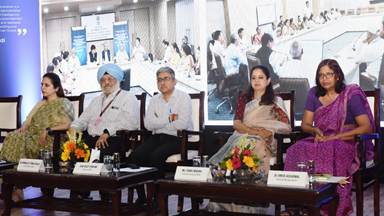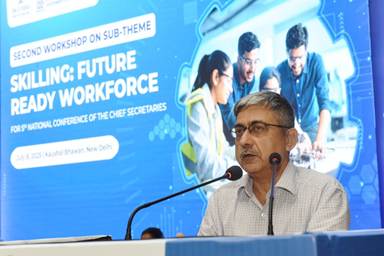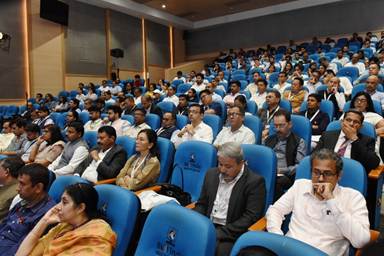MSDE and DARE host “Skilling: Future Ready” workshop at Kaushal Bhawan, New Delhi ahead of 5th National Conference of Chief Secretaries
MSDE and DARE host “Skilling: Future Ready” workshop at Kaushal Bhawan, New Delhi ahead of 5th National Conference of Chief Secretaries
The Ministry of Skill Development and Entrepreneurship (MSDE), in collaboration with the Department of Agricultural Research and Education (DARE), successfully hosted the second workshop on “Skilling: Future Ready Workforce” as a thematic prelude to the 5th National Conference of Chief Secretaries at Kaushal Bhawan, New Delhi. The workshop brought together senior policymakers, domain experts, industry leaders, and academia to chart a unified, future-ready skill development strategy for India. Anchored under the broader theme of “Human Capital for Viksit Bharat”, the workshop reflected the national resolve to build a resilient and future-ready workforce aligned with India’s long-term development vision.
Opening the session, Ms. Sonal Mishra, Additional Secretary, MSDE, emphasized the importance of aligning skilling initiatives with demographic trends, technological shifts, and emerging industry needs. She outlined five key focus areas for developing human capital for Viksit Bharat: Skilling for all, Filling the skill-employment gap, Demand-based skilling aligned with industry requirements, Strengthening service delivery systems, and Re-skilling and up-skilling of the existing workforce.
Addressing the workshop, Shri Rajit Punhani, Secretary, MSDE, said, “Skill training is the cornerstone of our vision for Viksit Bharat @2047. We must ensure that every youth and working professional is equipped with the right skills to contribute meaningfully to both organizational growth and the nation’s development. Our focus must be on three key pillars—agriculture skilling, ITI upgradation, and future skills. Integration of agri-skilling into mainstream education will empower rural youth and make agriculture a viable, future-ready career path. The ITI upgradation will help us transform these institutions into dynamic skilling hubs aligned with evolving industry needs. Emphasis on future skills will enable our workforce to stay competitive in a rapidly changing global landscape. Above all, we must focus on making skilling aspirational—something that excites, empowers, and elevates the aspirations of our youth.”
Shri Rajbir Singh, Deputy Director General, DARE, noted the central role of agriculture in India’s economy and emphasized the need to position skilling in agriculture and allied sectors as a national priority. He proposed transforming Krishi Vigyan Kendras (KVKs) into skill and incubation hubs that not only train farmers but also support rural youth through entrepreneurship handholding.
A detailed presentation on the recently approved ₹60,000 crore ITI Upgradation Scheme was delivered by the Directorate General of Training (DGT), outlining the Ministry’s roadmap to transform ITIs into modern, industry-aligned skilling hubs. The presentation showcased key components of the scheme and the strategic direction for its implementation across states. During the open discussion that followed, state officials shared progress made on the ground—including industry tie-ups, identification of regional skill clusters, and efforts to modernize infrastructure. At the same time, they also highlighted critical challenges, such as difficulty in onboarding private partners in smaller states, faculty shortages, and the need for increased industry engagement to ensure the sustainability and relevance of upgraded ITIs.
The workshop further delved deeper into five thematic sessions- Skilling for All, Filling the Skill–Employment Gap, Demand-Based Skilling with Industry Alignment, Strengthening Service Delivery, and Reskilling and Upskilling, with active participation from states including Karnataka, Odisha, Assam, Uttar Pradesh, and West Bengal, and representatives from various companies.
The states presented their best practices and innovative skilling models at the workshop, showcasing a diverse range of approaches to developing a future-ready workforce. Karnataka and Odisha shared inclusive skilling initiatives under the theme “Skilling for All”, while Assam contributed its perspectives on bridging the skill–employment gap. Uttar Pradesh and Tripura highlighted efforts towards demand-based skilling with a strong focus on industry alignment, and West Bengal elaborated on strategies to strengthen service delivery mechanisms at the grassroots level. These presentations reflected the regional diversity and shared commitment across states toward the national skilling agenda.
As part of the preparations for the 5th National Conference of Chief Secretaries under the theme “Human Capital for Viksit Bharat”, all States and Union Territories have been requested to seek inputs in the form of Feedback Notes from officers at all levels including field level functionaries. Feedback notes are to be uploaded on the CS Conference portal by 20 August 2025, and a consolidated state-specific note by 31 August 2025.
During the sessions, industry partners also played a vital role in the discussions, bringing to the table real-world insights and collaborative models. Representatives from Adobe, Sodexo, Avaada Group, Lemon Tree Hotels, UPS, Volvo-Eicher, Escorts, Tata Strive, and others contributed across thematic sessions covering topics such as reskilling, upskilling, and service delivery. Additionally, PSUs like Indian Oil and Bharat Petroleum shared their skilling and R&D initiatives. These interactions between government, academia, and industry emphasized the need for stronger convergence to equip India’s workforce for emerging job roles and evolving market demands.
Each session was followed by an open discussion that encouraged multi-stakeholder collaboration and identified innovative approaches to strengthen service delivery and align skill training with real-time employment demands.
The workshop was graced by Mr. Nirmaljeet Singh Kalsi, Former Chairperson, NCVET, Ms. Trishaljit Sethi, DG (Training), DGT, MSDE, Dr. Vinita Aggarwal, Executive Member, NCVET, Himanshu Gunawat, Deputy Secretary, MSDE, Padma Shri awardee Shri Sultan Singh, Dr. More Ramulu, Advisor, AICTE, representatives from various state skilling departments or ministries, IARI, New Delhi, DoNER, among others.
The workshop concluded with a consensus on the need for stronger convergence across stakeholders, investment in future-ready infrastructure, and leveraging international partnerships to build a resilient and inclusive skilling ecosystem. The outcomes and insights from the workshop will feed into the deliberations at the Chief Secretaries’ Conference and guide future skilling policy directions.


